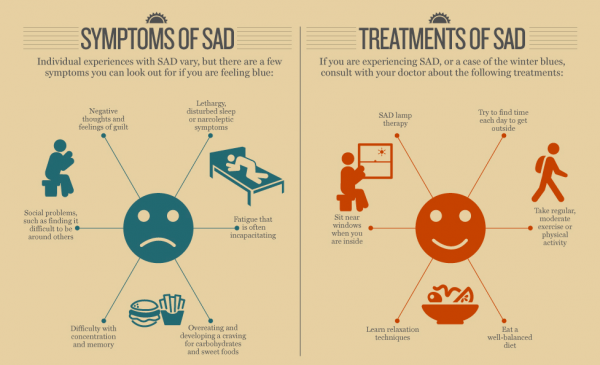Affecting about 10 percent of the population, Seasonal Affective Disorder occurs when there is less sunlight. PHOTO CREDIT: icarehn.com
As the weather gets colder, many people start to feel more depressed due to less sunshine, according to Cory Clark, a licensed psychologist and director at the University of Rhode Island Counseling Center.
Those who suffer from depression caused by changes in seasons may have seasonal depression or seasonal affective disorder.
“It affects around 10% of the population, and it is potentially related to less light and colder temperatures, so more people are staying indoors, so there’s less contact with others,” Clark said. “Particularly, not having light also lowers our vitamin D, which basically stops our energy.”
According to him, it could also be related to lower levels of serotonin as a result of less physical activity.
Being farther away from the equator also comes into play, according to Clark. For example, a person living in New England has a higher chance of experiencing seasonal depression than someone living in Florida because it’s farther away from the equator, where it’s warmer.
“Seasonal depression tends to be geared to the colder winter months because as the length of the day increases, some symptoms will re-emit,” Clark said.
The warning signs of seasonal depression are similar to a regular depressive episode, according to him. A person dealing with seasonal depression may begin to feel down, have less energy and want to sleep more, they may have a tougher time getting out of bed or they may feel tired and irritable, which can cause them to isolate themselves.
“Anyone can have it, it tends to be sort of an age bracket from six to late 50s,” Clark said. “So it affects a wide range of age groups, maybe a little more prevalent in women than men, but I’m not exactly sure why females are more prone to it than males.”
Devin Jervis, a master’s student at Johnson and Wales University and a graduate intern at the URI Counseling Center, said that treatment strategies such as exercising, socializing and other forms of self-care are useful methods to cope with seasonal depression.
According to Clark, one way students can manage their seasonal depression is by taking vitamin D supplements. Another option is light therapy which, according to The Mayo Clinic, are light boxes that mimic outdoor light, which may cause a change in the brain that lifts your mood and eases other symptoms of seasonal depression.
During that time, the light fights the changes in our circadian rhythm and the greater levels of darkness. According to the National Institute of General Medical Sciences, The circadian rhythm are physical, mental and behavioral changes that follow a 24-hour cycle.
Seasonal depression, just like many other forms of depression, can also be treated with antidepressants and other drugs that assist with clinical depression, according to Clark.
He said has treated patients that have seasonal depression in the past, but in order for diagnosis, it would have to happen for at least two years or longer. It’s a pattern that coincides with just those months of the year.
Jervis said that as the winter months come, it is easy to find at least a couple of people dealing with seasonal depression on campus.
“Usually, I don’t think people necessarily will self-identify with it, but as it gets colder, you can see an increase in cases of seasonal depression,” Jervis said. “But, I don’t think a lot of people don’t even know how to connect the change of seasons with their change in mood.”
According to Jervis, people can also recognize warning signs by trying to get a thorough history by looking back to see if this is a person’s first encounter with depressive symptoms, if it’s connected to any particular stressors, or if it was connected to a traumatic event.
“All of these questions line up with the remaining factors in terms of tying depressive episodes together.” Jervis said.
If you or someone you know is experiencing the symptoms of seasonal depression this season, visit the Counseling Center or contact them at 401-874-2288.





